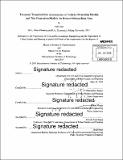| dc.contributor.advisor | P. Christopher Zegras and Mikel Murga. | en_US |
| dc.contributor.author | Han, Yafei | en_US |
| dc.contributor.other | Massachusetts Institute of Technology. Department of Civil and Environmental Engineering. | en_US |
| dc.coverage.spatial | n-us-ma | en_US |
| dc.date.accessioned | 2015-10-30T18:55:59Z | |
| dc.date.available | 2015-10-30T18:55:59Z | |
| dc.date.copyright | 2015 | en_US |
| dc.date.issued | 2015 | en_US |
| dc.identifier.uri | http://hdl.handle.net/1721.1/99566 | |
| dc.description | Thesis: M.C.P., Massachusetts Institute of Technology, Department of Urban Studies and Planning, 2015. | en_US |
| dc.description | Thesis: S.M. in Transportation, Massachusetts Institute of Technology, Department of Civil and Environmental Engineering, 2015. | en_US |
| dc.description | Cataloged from PDF version of thesis. | en_US |
| dc.description | Includes bibliographical references (pages 158-162). | en_US |
| dc.description.abstract | In the last few decades, travel demand models have undergone tremendous development and, today, are routinely used to support planning and policy decisions. But uncertainty in forecasting with such models is often overlooked, and its impact on forecast accuracy is rarely evaluated. My thesis is motivated to understand behavior uncertainty and model uncertainty in travel demand modeling. In particular, I assess the temporal transferability of vehicle ownership models and trip generation models for Boston metropolitan area from 1990 to 2010. Through statistical tests, I find significantly changed preferences in household vehicle ownership choice and trip production. For vehicle ownership choice, the effects of most socio-economic and demographic factors, and regional location factor have evolved; while the effects of local built environment factors and transit access are stable. Trip rates have changed over time, with decreased home-based work, home-based shopping, home-based bank and personal business, home-based social, home-based eating and non-home-based work trips; and increased home-based recreational and home-based work-related trips. The prediction tests suggest that failing to consider preference changes cause significant bias in forecasts. The transferred vehicle ownership model of 1991 under-predicts 0- vehicle households by 42.5%, and over-predicts 2-vehicle households by 14.8% in 2010. The transferred trip rates from 1991 overestimate total trips in 2010 by 7% to 9%. Homebased work-related, home-based pick-up and drop-off, and home-based recreational trips are significantly unpredicted by 34%, 12% and 27%; while home-based work, home-based shopping, home-based social, and non-home-based work trips are significantly overpredicted by 9%, 20%, 31%, and 69%. Different model specifications have shown a modest range of variability in prediction outcomes, suggesting model specification uncertainty has less influence on forecasts than behavior uncertainty. In vehicle ownership modeling, children, seniors, and local built environment variables improve the prediction accuracy for 0-vehicle group. But all model specifications cannot well distinguish between 0- and 1-vehicle households, and between 2- and 3-vehicle households. Household characterization affects the prediction accuracy for certain trip purposes. Including more detailed household information may lead to worse forecasts because of large sampling variance. Future works are suggested to incorporate behavior uncertainty in forecast, explore uncertainty in model structure, and evaluate the practical implications of the lack of model transferability. | en_US |
| dc.description.statementofresponsibility | by Yafei Han. | en_US |
| dc.format.extent | 162 pages | en_US |
| dc.language.iso | eng | en_US |
| dc.publisher | Massachusetts Institute of Technology | en_US |
| dc.rights | M.I.T. theses are protected by copyright. They may be viewed from this source for any purpose, but reproduction or distribution in any format is prohibited without written permission. See provided URL for inquiries about permission. | en_US |
| dc.rights.uri | http://dspace.mit.edu/handle/1721.1/7582 | en_US |
| dc.subject | Urban Studies and Planning. | en_US |
| dc.subject | Civil and Environmental Engineering. | en_US |
| dc.title | Temporal transferability assessments of vehicle ownership models and trip generation models for Boston Metropolitan Area | en_US |
| dc.type | Thesis | en_US |
| dc.description.degree | M.C.P. | en_US |
| dc.description.degree | S.M. in Transportation | en_US |
| dc.contributor.department | Massachusetts Institute of Technology. Department of Civil and Environmental Engineering | |
| dc.contributor.department | Massachusetts Institute of Technology. Department of Urban Studies and Planning | |
| dc.identifier.oclc | 924324250 | en_US |
